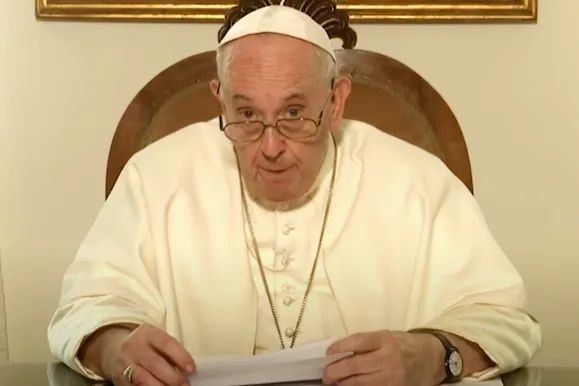
CNA Newsroom, Mar 5, 2024 / 09:25 am (CNA).
Ahead of a crucial vote on Friday, the bishops of Ireland have raised grave concerns about proposed changes to the country’s constitution, warning these would abolish “all reference to motherhood” and diminish the “unique importance of the relationship between marriage and family.”
On International Women’s Day, March 8, voters in the country of more than 5 million people will head to the polls to cast their ballot in twin referendums proposing historic changes to the Constitution of Ireland.
The first referendum pertains to the family and would amend Article 41.1 by introducing “other durable relationships” alongside marriage as the foundation of the family.
The second referendum would delete a wording on women and motherhood in Article 41.2, where the state recognizes “that by her life within the home, woman gives to the state a support without which the common good cannot be achieved.” Therefore, the state shall “endeavor to ensure that mothers shall not be obliged by economic necessity to engage in labor to the neglect of their duties in the home.”
This wording on women, motherhood, and even the home in the Irish Constitution would be replaced by a gender-neutral amendment, where the state recognizes that “the provision of care, by members of a family to one another by reason of the bonds that exist among them” gives to society a “support without which the common good cannot be achieved and shall strive to support such provision.”
The proposed changes have alarmed the Catholic Church in Ireland.
Bishops warn of impact on youth, families
In a statement published Feb. 25, the Irish bishops warn that the proposed amendment on family “diminishes the unique importance of the relationship between marriage and family” and is “likely to lead to a weakening of the incentive for young people to marry.”
The Irish prelates affirm that “the commitment of marriage contributes to the common good in a unique way by bringing stability to the family and society, and that it consequently deserves the protection of the state.”
While marriage is also a public and legal commitment, the bishops continue, the term “durable relationship” is “shrouded in legal uncertainty and is open to wide interpretation.”
David Quinn of The Iona Institute, which promotes the place of marriage and religion in society, has raised concerns about the “very ambiguous term.”
Supporters of the twin referendums on March 8 see the proposed changes as part of social progress in the country and an end to “very outdated language in our constitution,” to quote Taoiseach (prime minister) Leo Varadkar.
Rapid social change in Ireland — a country once regarded as a Catholic powerhouse — has brought about the legalization of same-sex marriage in 2015 and free contraception in 2022.
‘What benefit is it’ to delete ‘woman’ and ‘mother’?
Countering claims of sexism and asserting the “role of mothers should continue to be cherished in our constitution,” the Irish bishops dismiss the notion that the current wording states that “a woman’s place is in the home.”
Instead, they argue, it is “reasonable to ask what benefit is it to Irish society to delete the terms ‘woman’ and ‘mother’ from the Constitution of Ireland?”
For supporters of the change, such as academic Caitriona Beaumont, the benefit is the removal of Ireland’s Catholic heritage. The professor of social history at London South Bank University wrote on Feb. 2: “If Ireland is to fully shake off the shackles of its Catholic past and achieve its ambition to be a modern and progressive nation, then Article 41.2 must be consigned to the annals of history.”
As supporters of the current wording point out, however, surveys have shown that almost two out of three Irish mothers would prefer to stay at home to raise their children, given the choice.
“The present constitutional wording does not in any way inhibit women from working or taking their proper place in social and public life,” the bishops note. “It does, however, respect the complementary and distinct qualities that arise naturally within the family.”
Care in or outside the home?
The Irish bishops note a further concern: “People generally recognize the enormous commitment that women in Ireland have given, and continue to give, in relation to care, love, and affection in the home.”
With the proposed changes, however, the home will also be removed from the article in the Irish Constitution.
Writing in the European Conservative, Dualta Roughneen noted: “The implications are unclear; but in a society that increasingly outsources care to institutions — whether children, the elderly, or the infirm — it will remove any constitutional preference for care in the home.”
Concluding their statement, the Irish bishops remind the faithful of the words of St. John Paul II, who said in Ireland in 1979: “The future of the Church, the future of humanity depend in great part on parents and on the family life that they build in their homes. The family is the true measure of the greatness of a nation, just as the dignity of man is the true measure of civilization.”
If you value the news and views Catholic World Report provides, please consider donating to support our efforts. Your contribution will help us continue to make CWR available to all readers worldwide for free, without a subscription. Thank you for your generosity!
Click here for more information on donating to CWR. Click here to sign up for our newsletter.






Hardly at a “crossroads”.
The Irish majority enshrined abortion in their constitution…the rest naturally follows.
See France.
Yes, Ramjet. Sadly this is just one more example of that ripple effect.
Taking an instructive glance back…all this in only 180 years! After the tyranny of the Reformation in Ireland, later in 1846 came the so-called “Irish Church Missions,” the purpose of which was to convert (“backwardist?”) Catholics into forwardist Protestants.
Not unlike our often ambivalent and content-challenged evangelization and signaling of today, we read of the Missions:
“They taught and as far as I know, teach NO CREED WHATSOEVER [caps in original]; and hence they teach no distinct form of religious belief. The result of such a system is clear enough. They succeed in destroying the faith of poor Catholic children who come under their influence, but do not make them Protestants; they make them miserable, creedless beings, and no doubt, in some cases, decided unbelievers. What a result from such labour and outlay! [….] The Society of Church Missions to the Irish Roman Catholics has seen its best day [!!!], but let no Catholic disregard it. There is work in it yet. To despise or ignore this fact, would be a grievous mistake, which those who are charged with the great and solemn duty of protecting the Faith in Ireland are not likely to commit” (Canon O’Rourke, PP, MRIA, “The Battle of Faith in Ireland,” Dublin, 1887 with recent reprints, p. 554).
Yet where is Pope Francis on this? To my knowledge he has not uttered a word on this matter.
This is all very clear.
“Other durable relationships”. Away with “woman” and “mother”. March 8.
This was inevitable.
Feminism was conceived by women with unhappy, unsatisfying lives who had resentments against men.
It has always measured women’s accomplishments by the same yardstick as men’s.
So — quite ironically — feminism has always discounted the wonders and the glories of the feminine.
Feminists always resented the fact that society assigned different roles to men and women.
Men customarily cleared land, hunted game, defended their families, amassed wealth, conquered enemies, discovered new continents, invented new technologies.
Whereas women, by contrast, customarily conceived, bore and fed children, kept homes clean, washed clothes, and loved and cared for their families.
This sexually determined division of labor made sense, given that human life was a subsistence proposition at best for the species’ entire existence, until well into the twentieth century.
Until the invention of the automobile, the tractor and the automatic washer, a woman’s life and the lives of her family quite literally depended on her selflessness and dedication. Just a hundred and fifty years ago, most homes did not have running water. And most did not have flushing toilets for another half century after that.
The feminists’ resentful discounting of “woman’s work” was a slap in the face to every generation of women who had gone before.
The truth is, the work that women do — conceiving and nurturing new life — is infinitely more valuable, more creative, more glorious than anything men can hope to do.
It is tragic that the woman’s role is utterly discounted by feminists.
In fact, it’s worth than that. Feminists have placed themselves in opposition to everything women have traditionally done, celebrating careerism as more valuable than raising families and enshrining abortion as a woman’s fundamental right.
Since they have never valued women’s contributions to society, it was probably inevitable that eventually feminists would try to erase the differences between the sexes, denying that women — females — even exist.